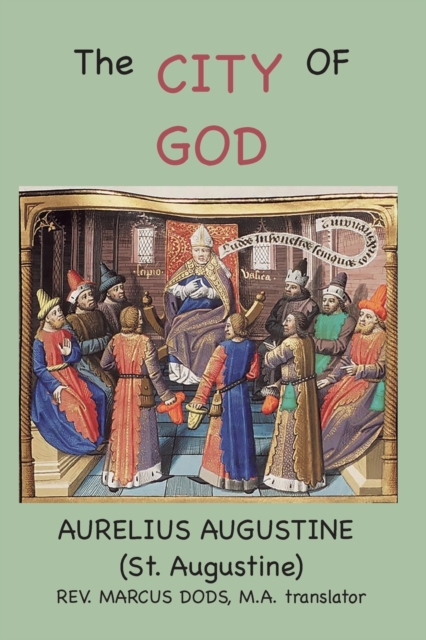The City of God

The City of God
On the City of God Against the Pagans (Latin: De civitate Dei contra paganos), often called The City of God, is a book of Christian philosophy written in Latin by Augustine of Hippo in the early 5th century AD. The book was in response to allegations that Christianity brought about the decline of Rome and is considered one of Augustine's most important works, standing alongside The Confessions, The Enchiridion, On Christian Doctrine, and On the Trinity. As a work of one of the most influential Church Fathers, The City of God is a cornerstone of Western thought, expounding on many questions of theology, such as the suffering of the righteous, the existence of evil, the conflict between free will and divine omniscience, and the doctrine of original sin.
The book presents human history as a conflict between what Augustine calls the Earthly City (often colloquially referred to as the City of Man, but never by Augustine) and the City of God, a conflict that is destined to end in victory for the latter. The City of God is marked by people who forgo earthly pleasure to dedicate themselves to the eternal truths of God, now revealed fully in the Christian faith. The Earthly City, on the other hand, consists of people who have immersed themselves in the cares and pleasures of the present, passing world.
This concept of world history guided by Divine Providence in a universal war between God and the Devil is part of the official doctrine of the Catholic Church as most recently stated in the Second Vatican Council's Gaudium et Spes document: "The Church ... holds that in her most benign Lord and Master can be found the key, the focal point and the goal of man, as well as of all human history ... all of human life, whether individual or collective, shows itself to be a dramatic struggle between good and evil, between light and darkness ... The Lord is the goal of human history, the focal point of the longings of history and of civilization, the center of the human race, the joy of every heart, and the answer to all its yearnings."
PRP: 247.59 Lei
Acesta este Prețul Recomandat de Producător. Prețul de vânzare al produsului este afișat mai jos.
222.83Lei
222.83Lei
247.59 LeiLivrare in 2-4 saptamani
Descrierea produsului
On the City of God Against the Pagans (Latin: De civitate Dei contra paganos), often called The City of God, is a book of Christian philosophy written in Latin by Augustine of Hippo in the early 5th century AD. The book was in response to allegations that Christianity brought about the decline of Rome and is considered one of Augustine's most important works, standing alongside The Confessions, The Enchiridion, On Christian Doctrine, and On the Trinity. As a work of one of the most influential Church Fathers, The City of God is a cornerstone of Western thought, expounding on many questions of theology, such as the suffering of the righteous, the existence of evil, the conflict between free will and divine omniscience, and the doctrine of original sin.
The book presents human history as a conflict between what Augustine calls the Earthly City (often colloquially referred to as the City of Man, but never by Augustine) and the City of God, a conflict that is destined to end in victory for the latter. The City of God is marked by people who forgo earthly pleasure to dedicate themselves to the eternal truths of God, now revealed fully in the Christian faith. The Earthly City, on the other hand, consists of people who have immersed themselves in the cares and pleasures of the present, passing world.
This concept of world history guided by Divine Providence in a universal war between God and the Devil is part of the official doctrine of the Catholic Church as most recently stated in the Second Vatican Council's Gaudium et Spes document: "The Church ... holds that in her most benign Lord and Master can be found the key, the focal point and the goal of man, as well as of all human history ... all of human life, whether individual or collective, shows itself to be a dramatic struggle between good and evil, between light and darkness ... The Lord is the goal of human history, the focal point of the longings of history and of civilization, the center of the human race, the joy of every heart, and the answer to all its yearnings."
Detaliile produsului










